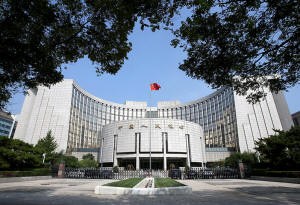China cuts several major interest rates to support fragile economy
 Send a link to a friend
Send a link to a friend
 [July 22, 2024] SHANGHAI
(Reuters) -China surprised markets by cutting major short and long-term
interest rates on Monday, its first such broad move since August last
year, signaling intent to boost growth in the world's second-largest
economy just days after a Communist Party leadership meeting. [July 22, 2024] SHANGHAI
(Reuters) -China surprised markets by cutting major short and long-term
interest rates on Monday, its first such broad move since August last
year, signaling intent to boost growth in the world's second-largest
economy just days after a Communist Party leadership meeting.
The cuts to the central bank's key short-term policy rate, its market
operations rates and benchmark bank lending rates came after China
reported weaker-than-expected second-quarter economic data last week and
its top leaders met for a plenum that occurs roughly every five years.
The country is verging on deflation and faces a prolonged property
crisis, surging debt and weak consumer and business sentiment. Trade
tensions are also flaring, as global leaders grow increasingly wary of
China's export dominance.
"The cut today is an unexpected move, likely due to the sharp slowdown
in growth momentum in the second quarter as well as the call for
'achieving this year's growth target' by the third plenum," said Larry
Hu, chief China economist at Macquarie.
The People's Bank of China (PBOC) said on Monday it would cut the
seven-day reverse repo rate to 1.7% from 1.8%, and would also improve
the mechanism of open market operations. That is the first cut to the
rate since August 2023.

Minutes later, China cut benchmark lending rates by the same margin at
the monthly fixing. The one-year loan prime rate (LPR) was lowered to
3.35% from 3.45% previously, while the five-year LPR was reduced to
3.85% from 3.95%.
The PBOC subsequently lowered the rates on its standing lending facility
(SLF), a type of loan that it gives commercial banks to fulfill their
temporary cash demands, by the same amount.
Ju Wang, head of Greater China FX & rates strategy at BNP Paribas, said
that growing expectations for the Federal Reserve to start cutting
interest rates also gave the PBOC room to ease its policy, given the
pressure the yuan has been under because of a wide yield gap with the
dollar.
The official Xinhua news agency cited unnamed sources close to the PBOC
as saying the "decisive" rate cut showed its determination to bolster
the recovery and it was in response to the plenum's aims to achieve this
year's growth target.
The PBOC also made adjustments to its lending program, saying collateral
requirements for medium-term lending facility loans will be lowered from
July.
[to top of second column] |

Headquarters of the People's Bank of China (PBOC), the central bank,
is pictured in Beijing, China September 28, 2018. REUTERS/Jason Lee/
File Photo

Analysts said that meant banks would need to hold fewer longer-term
bonds for collateral needs and could sell or trade more, helping the
central bank with its mission to put a floor under longer-term
yields, rein in a bubble in bonds and get a steeper yield curve.
Following the rate cuts, China's yuan dropped to a near two-week low
of 7.2750 per dollar, before paring some losses.
Chinese sovereign bond yields fell across the curve, with 10-year
and 30-year down as much as 3 basis points, before stabilizing at
2.24% and 2.45%, respectively.
China's 30-year treasury futures for September 2024 delivery were up
0.33% in afternoon trade on Monday.
"The fact that PBOC didn't wait for the Fed to cut first indicates
that the government recognizes the downward pressure on China's
economy," said Zhang Zhiwei, president and chief economist at
Pinpoint Asset Management.
He expects more rate reductions in China after the Fed begins a
rate-cutting cycle.
China's rate cuts are aimed at "strengthening counter-cyclical
adjustments to better support the real economy," the PBOC said in a
statement.
The announcement also comes after the PBOC said it would revamp its
monetary policy transmission channel. PBOC Governor Pan Gongsheng
said last month the seven-day reverse repo basically serves the
function of the main policy rate.
"This is also a reflection of the improvement of the market-oriented
interest rate mechanism," Xinhua quoted the source as saying.
(Reporting by Shanghai and Beijing newsrooms; Editing by Vidya
Ranganathan, Jamie Freed and Jacqueline Wong)
[© 2024 Thomson Reuters. All rights
reserved.]
This material may not be published,
broadcast, rewritten or redistributed.
Thompson Reuters is solely responsible for this content.
 |